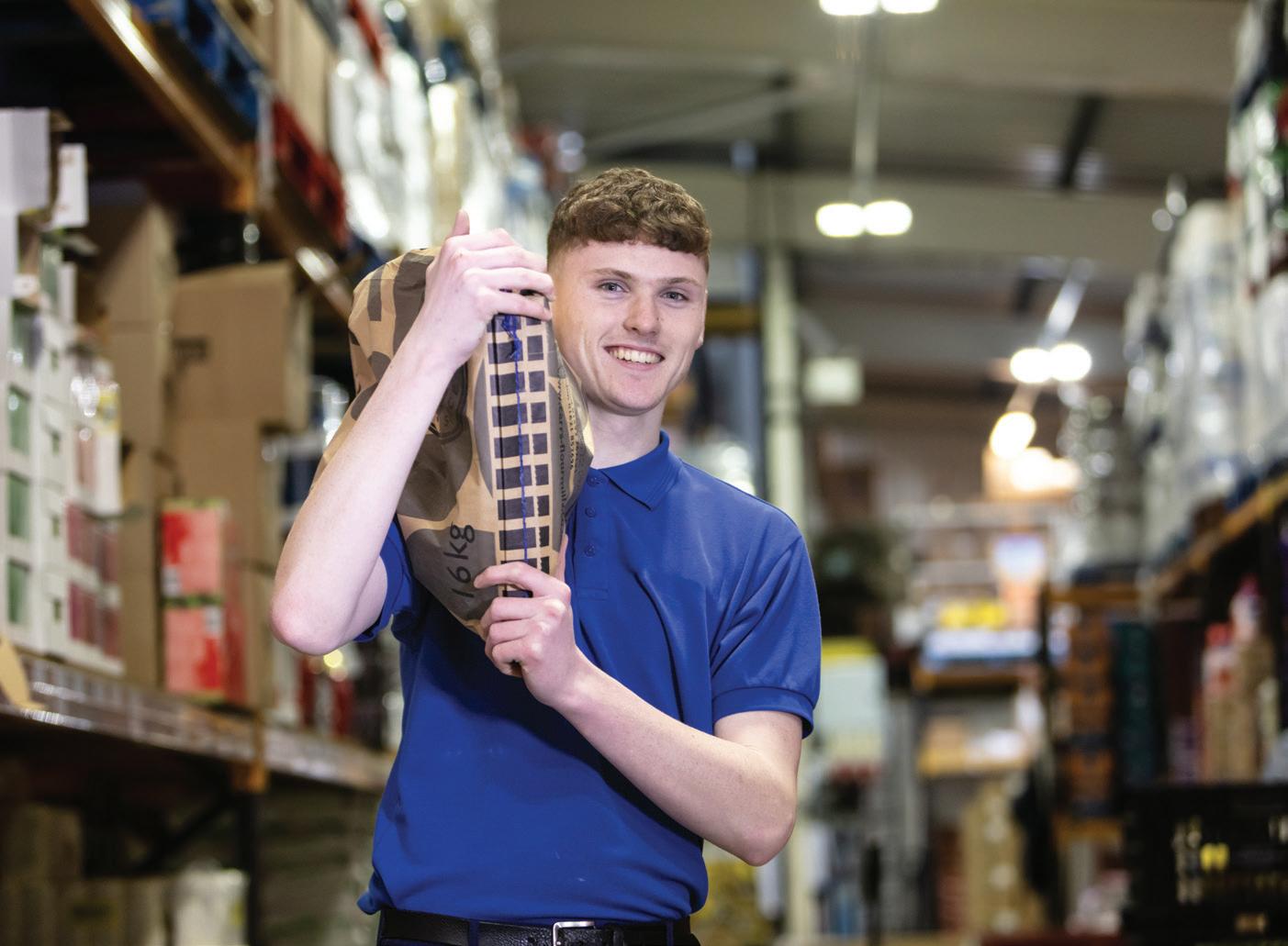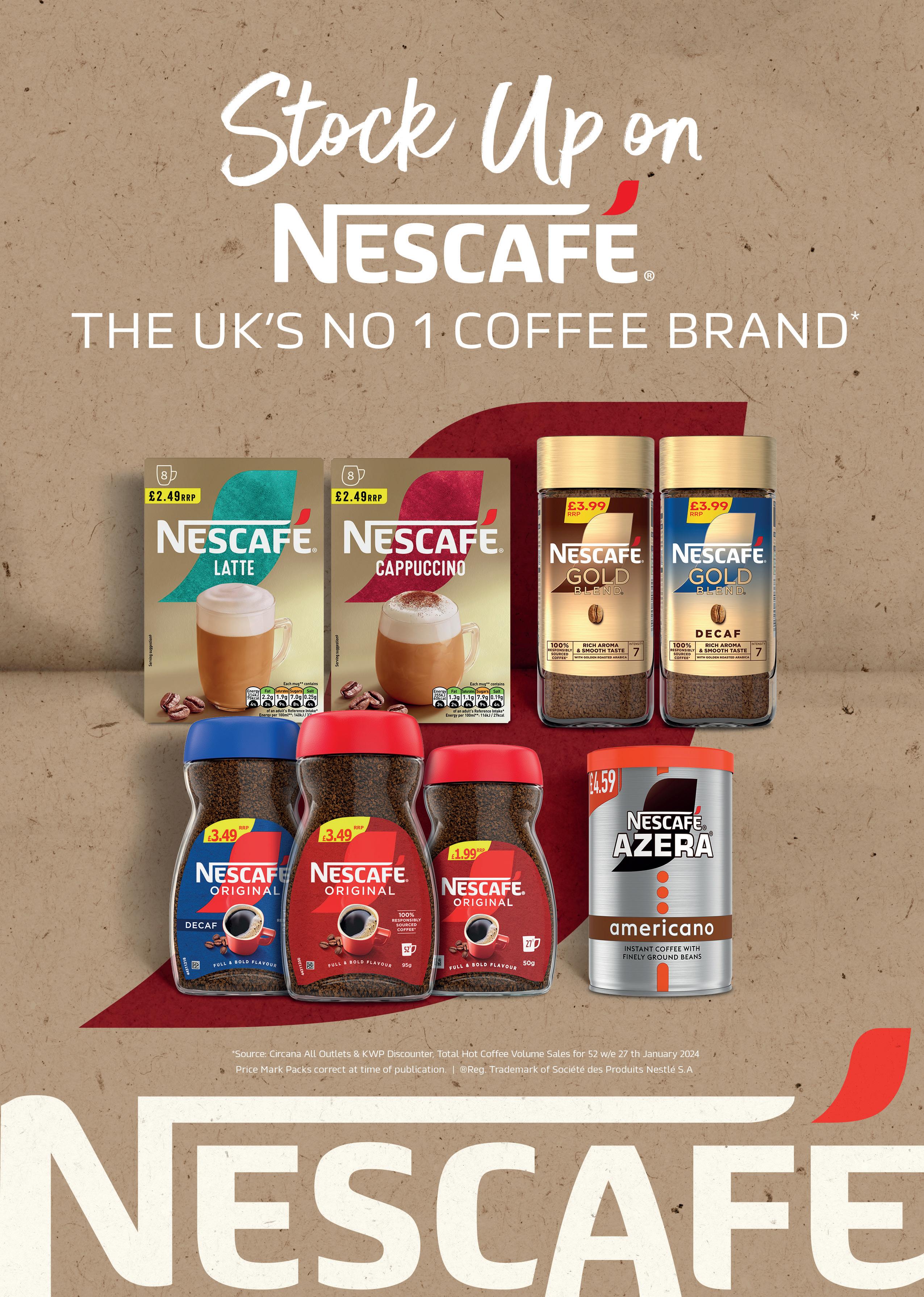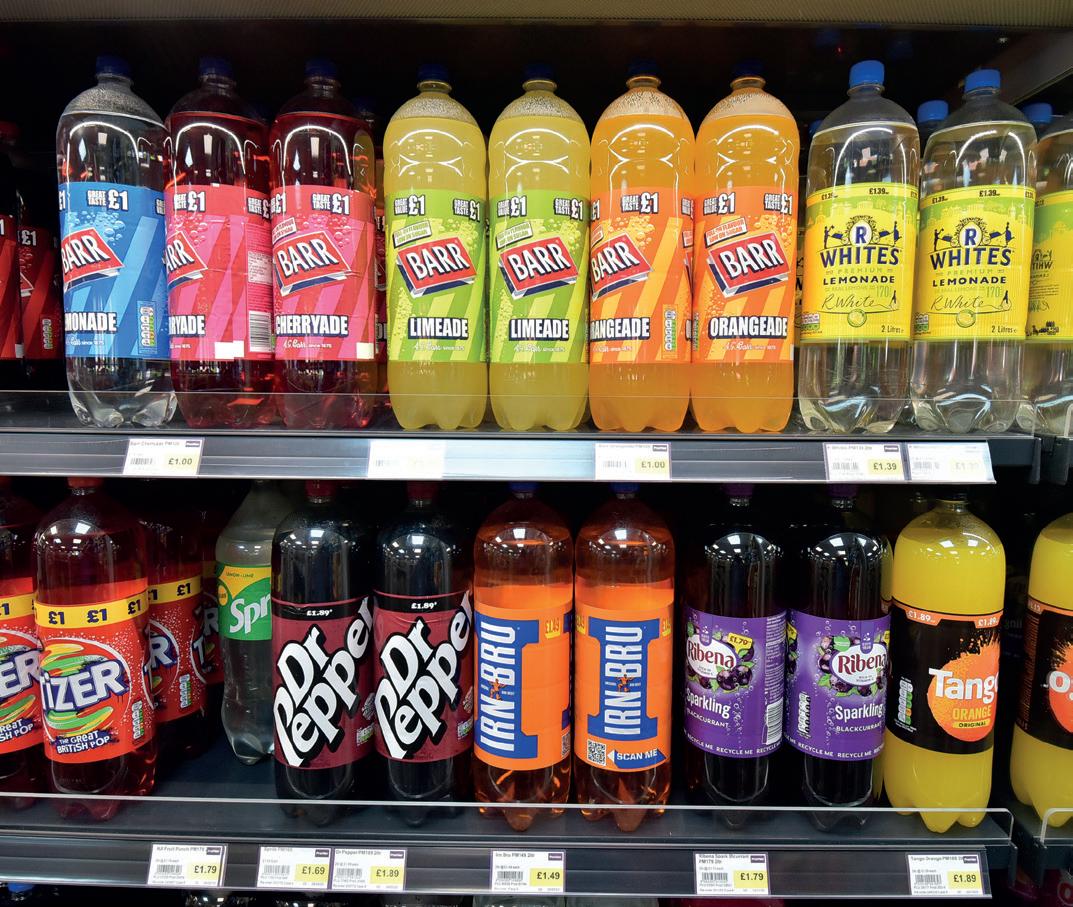





Innovation and strategy
How to become a modern business and achieve longterm success







How to become a modern business and achieve longterm success
 Paul Hill Editor
Paul Hill Editor
Innovation has always been the key to long-term success in wholesale, and as new threats continue to emerge, it’s never been more important to modernise and diversify operations.
For this edition, I spoke to two wholesalers that have done exactly that through differing methods, and they’ve both experienced huge financial and operational growth as a result.
Pricecheck is a company that last month achieved record-breaking revenue for the year, quarter and month all within the same week.
EDITORIAL
Editor Paul Hill
Editor in chief Louise Banham
Head of design
Anne-Claire Pickard
Production editor Ryan Cooper
Sub editors Jim Findlay, Robin Jarossi
Senior designer Jody Cooke
Junior designer Lauren Jackson
Contributors Tamara Birch, David Gilroy, Tom Gockelen-Kozlowski, Edward Hutchison, Simon Jones, Rob Mannion, Scott Sandilands, Matt Sherweng
Production coordinator Bod Adegboyega

This equates to £151m in turnover for the 2023/24 financial period and 15% growth compared to the previous 12 months.
The Sheffield wholesaler’s export model has played a pivotal role in this, and managing director Debbie Harrison talked me though its strategy, with export sales now exceeding pre-Brexit levels.
Meanwhile, expansion has been key to Filshill’s success in Glasgow, and the man who oversaw the huge move into a new headquarters, Andrew Allison, sat down with me to explain how the wholesaler managed it.
The 16-metre-high warehouse is arguably the most modern in the country – with 211 solar panels covering 400sqm of roof space, along with 12 loading docks and an innovative four-floor pick tower that can hold approximately 1,520 pallets, as well as standard storage racking with capacity to hold 8,650 pallets.
These two examples prove that with risk comes reward, and they offer inspiration that innovation can equate to huge growth in wholesale.
SALES
Head of commercial
Natalie Reeve 020 7689 3367
Associate director
Charlotte Jesson 020 7689 3389
Account managers
Megan Byrne 020 7689 3372
Lindsay Hudson 020 7689 3366
Lisa Martin 020 7689 3364
Commerical project manager
Ifzal Afzal 020 7689 3382
Printed by Acorn Web Offset
Ltd, Loscoe Close, Normanton Industrial Estate, Normanton, West Yorkshire, WF6 1TW
Distributor Seymour Distribution, 2 East Poultry Avenue, London, EC1A 9PT
Newtrade Media Limited, 11 Angel Gate, City Road, London EC1V 2SD Tel 020 7689 0600
Better Wholesaling Insight is published by Newtrade Media Limited, which is wholly owned by NFRN Holdings Ltd, which is wholly owned by the Benefits Fund of the National Federation of Retail Newsagents. Reproduction or transmission in part or whole of any item from Better Wholesaling may only be undertaken with the prior written agreement of the Editor. Contributions are welcomed and are included in part or whole at the sole discretion of the editor. Newtrade Media Limited accepts no responsibility for submitted material. Every possible care is taken to ensure the accuracy of information. Better
Join the conversation: @BW_mag Cover image credit: Getty Images/djvstock
P6-7: Viewpoint
Can solutions to the squeeze on margins be found in innovation?
P8-9: Exporting
How an export model can be a game-changer if the proposition is right
P10-11: Expansion
How Filshill achieved its expansion and what the future now holds for the company
P12: Guide
How to achieve high-density storage within a depot to meet various challenges
P13: Predictions
What will come of the Extended Producer Responsibility scheme?
P14-15: Interview
Events wholesaler Freemans talks us through its unique proposition and future plans
P16: Opinion
Why wholesalers should be taking advantage of digital operational technologies
P17: Predictions
What does the future have in store for warehouse automation?
P18-19: AI
TWC reveals why AI can be a force for good
P20: Opinion
Innovation is a mindset wholesalers need to hold on to
P22-26: Foodservice focus
Analysing the latest trends in the multi-faceted retail sector
P28: Buying groups
Caterfood speaks about its developments
P30: Buying groups
Caterforce on what it is doing for its members
P32: Buying groups
Confex reveals all of the goings on in the business
P34: Buying groups
NBC on how it’s achieved growth this year
P36: Buying groups
Sugro explains its latest plans for its members
P38: Buying groups
Unitas gives an insight into its recent work
CATEGORY ADVICE
P4-5: One Minute Depot Manager
Lamb Weston on its latest innovation
P25: Advice
Why you should attend Imbibe Live
P40-44: Sector review
The latest developments and opportunities within the world of price-marked packs
P46-52: Sector review
How to navigate the quickly evolving market of tobacco, vaping and next-gen nicotine https://bit.ly/3lvj7FC



















































Lamb Weston talks us through its latest innovation – REALLY Crunchy Fries
Lamb Weston is an innovative, global supplier of frozen potato products. For more than 70 years, they have led the industry introducing inventive products, simplifying back-of-house catering operations and making delicious products for consumers. From growing potatoes, to proactive customer partnerships, Lamb Weston strives for more and never settles for less.
REALLY Crunchy Fries hold their crunchiness for 30 minutes. These innovative, artisan-looking and -tasting coated fries promise an unbeatable crunch sensation for unique sensory dining experiences, and have been developed exclusively for the out-of-home channel.
REALLY Crunchy Fries is the occasion fry for adding the ‘wow’ factor to your menu because of the theatre it can deliver. It’s great promoted in summer as a ‘dirty fries’ option, or around Christmas party season as sharing food or in winter as the basis for a loaded dish.
Wholesalers should make sure REALLY Crunchy Fries are stocked alongside the rest of the Lamb Weston range, and most definitely next to the popular Stealth Fries to make picking in depot more efficient, and to increase brand visibility.
REALLY Crunchy Fries is great innovation in action. A thick, textured coating is used to give it that extra crunch, and they’re totally vegan and gluten-free. This premium product will add value to any menu, leading to increased profits.
30-minute long-lasting crunch sensation!

In partnership with


SUPPLIER VIEWPOINT
Craig Westcott Trade marketing manager, Lamb Weston
“REALLY Crunchy is an innovation that we’re really proud of at Lamb Weston – each fry can deliver up to 16 crunches. We believe this offers a truly memorable dining experience and can offer a unique proposition for operators at a time where consumers are becoming increasingly adventurous when treating themselves.”

WHOLESALER VIEWPOINT
Dean Pendlebury Head of trading, Country Range
“Lamb Weston is a highly valued partner to Country Range, providing strong sales and marketing support for our members. With a rich history of innovation, it is great to work with the team at Lamb Weston as they bring their latest product to market in REALLY Crunchy Fries. We are looking forward to working together to help drive growth for our members and deliver an exciting campaign.”
Gilroy’s viewpoint: There is a profit imperative for wholesalers feeling the squeeze on margins and upward pressure on costs. Can solutions be found through innovation?

Imagine your personal work performance being played out in the public domain and constantly commented on by ‘experts’ and stakeholders. This is the lot of Premier League football coaches with the brutal, relentless emphasis on results. Thirteen coaches have been sacked this season out of 20 clubs. That’s a 65% disposal rate. Why so destructive? There’s a ton of money flooding through the game and the stakes are high.
Football was codified in England in 1863. It soon became a serious professional national sport. By the 1980s, the old First Division top-tier had become stale and tired. Stadiums were deteriorating, and hooliganism and racism were rife. Football matches were not family friendly, and attendances were declining. English teams had been banned from European competitions and the English game was decaying,
being overtaken by more progressive European nations.
The founding of the FA Premier League in 1991 was a reset and a turning point. The new league could negotiate its own broadcast, media and sponsorship deals. The 1991/92 season started with a £304m deal with BskyB. The financial reward structure ensured that every match was important, increasing competition and generating much-needed investment for club facilities. New all-seater stadiums were being built.
Today, the overall level of the game in all areas is unrecognisable from that of 30 years ago. The current deal is £5bn, due to rise to £6.7bn in 2025. The Premier League is the most-watched sports league globally. High-quality players and coaches from all over the world operate in the English league, and standards have risen massively.
Tom Allnutt of the Sunday Times points out that it is 40 years since an English manager last won the European Cup/Champions League – the highest-ranked club competition. Of the 20 Premier League clubs, only four have English coaches, with clubs preferring to hire talent from abroad.
A more academic and thoughtful approach to the game is an increasingly common trait among the very best managers. Allnutt cites Jürgen Klopp of Liverpool as an exemplar, with his expertise in psychology, medicine, physiology and anatomy. He says Arsene Wenger’s appointment at Arsenal in 1997 was a pivotal moment in English

football. As an innovator, he introduced specific player conditioning regimes, athleticism and dietary management to improve performance, insulate against injury and prolong playing careers. Arguably the best innovator is Pep Guardiola at Manchester City. His coaching is completely different to anyone else’s, and his success rate is phenomenal.
Innovation is well underway in other major sports. Cricket has experienced a transformation since the launch of the Indian Premier League (IPL) in 2008. The Twenty20 format is compelling for fans and the media. Media rights for 2023 to 2027 sold for $6.4bn to Viacom18 Star Sports.
Last year’s final was the moststreamed live event, with 32 million viewers. The IPL has had a profound impact on Test cricket, too, inspiring faster scoring and sharper fielding.
Could we experience a Premier League event in our industry? Businesses need continual investment. This requires cash, and cash requires profit. Sales and margins are under pressure. Overheads are rising; punitive energy costs hurting, business rates soaring and the new minimum-wage increase of 9.8% – which represents the largest-ever labour cost increase in cash terms – is a challenge. There is a profit imperative in wholesale. Is it possible to innovate

for profit? Michael Boyles, of Harvard Business School, defines innovation as a product, service, business model or strategy that is novel and useful.
Innovations don’t have to be major breakthroughs – they can be as simple as upgrades to a company’s customer service, or might be features added to an existing product. How might we harness such innovations?
Emulate discount-retailers’ middle-aisle strategy by featuring seasonally relevant high-margin non-food ranges. These ranges are incredibly popular with all shopper types. Merchandise in a highly visible location, powerfully themed and supported by the marketing.
Introduce electronic point-of-sale shelf labelling across the depot. This technology is now widely used in Europe and Asia. It significantly reduces time taken to adjust shelf pricing and opens possibilities for flexible pricing, which could strengthen margins and help clear short-life goods. The additional benefit of the labour, paper and print savings in replacing hard-copy labels adds further value.
Next up is space efficiency. Stock equals money and slow-moving stock is capital tied up that could be better employed elsewhere. Defining what a
‘slow seller’ is and then purging any from a range is vital. Just as important is recognising declining markets and slimming down the space and range to make way for the growth markets. The overall range becomes more productive, resulting in higher margins and improved liquidity.
Product availability is pivotal to any successful business. Substantial profit is lost through missing products. Monitoring and following up on the stock-out status is a constant challenge for management.
Spar Scotland wholesaler CJ Lang has adopted a camera system that scans shelves to identify low or no stock. Seventy cameras count stock automatically overnight and monitor product positioning during the day, producing product availability reports for management.
Morrisons is implementing a similar camara-based system that will provide real-time on-shelf data to direct staff to where stocks are running low, improving service and saving labour.
Supercharge online and digital; there is so much profitable mileage to be gained from exploiting digital in many areas. Stepping up WhatsApp marketing through Meta’s business package enables low-cost, agile and targeted marketing to the customers who best respond and return the highest profit.
The shorter lead times for WhatsApp campaigns make it a perfect vehicle for tactical calls such as weather-related offers and sports events.
There is a spin-off saving in brochure costs. The beauty of WhatsApp is that it requires no technological development and most business people operate 24/7 on their mobile devices. This can be linked to extracting value from the customer files to incentivise the most profitable customers and to lock in loyalty-driving sales in the most customer-appropriate categories to improve margin mix.
The next level up is an app-based loyalty scheme. Loyalty schemes are being operated effectively in varying sectors, such as coffee shops and vape vendors.
Commentators attribute Lidl’s overindexing sales growth to the Lidl Plus rewards initiative launched in 2020. It rewards users with personalised product discounts and enables Lidl to collect data on their purchases and preferences. In February, Lidl focused on discounts on bakery purchases and secured a 24% increase in sales in the first quarter as a result. Wholesalers could drive profitable sales in selected categories using similar methods.
Open banking offers serious cost savings in payment functions. Implementing open banking across all channels is straightforward. It is a frictionless experience; customers can see what they owe and view previous invoices.
They can pay off a balance, an invoice or multiple invoices. Money can be transferred immediately, and high merchant fees associated with debit cards can be avoided.
This can save wholesalers hundreds of thousands of pounds every year. In parallel, the accounts team receives an email confirming that monies have been received, who the sender is and which invoice the payment relates to. With open banking, requests for payment are incorporated into automated digital notifications sent to customers based on the specific payment terms of the invoice or account thus closing the follow-up loop.
Even in our margin-thin industry, by critically analysing all profit elements and by taking an innovative approach to improving business results, wholesalers can enrich bottom-line performance. It’s not as brutal as the Premier League –just as effective. l
Paul Hill finds out how exporting can be a game-changer for wholesalers if they get their proposition right
 Debbie Harrison
Debbie Harrison
Joint managing director, Pricecheck
PH: What are the key considerations before venturing into exporting products?
DH: First and foremost, research is key. While visiting the territory may seem obvious, it’s the best way to understand if your product will work in the market. Consider target demographics, competitors and market trends, as well as whether it works alongside local regulations and cultural preferences.
Other factors to take into consideration before entering new export markets are market stability and the ease of doing business, as well as customs, tax and paperwork.
It’s also important to consider your workforce, their skills and capabilities. Do you have people who are happy to travel? A multilingual workforce?
Special knowledge in international logistics? If not, ensure you are prepared and able to support with training or recruitment. Be prepared for ups and downs.
Which markets show the most potential for your products, and why?
As a large wholesaler and distributor of fast-moving consumer goods (FMGC), we stock more than 8,000 products at any given time – so it’s hard to narrow this down to just a few.
Due to the international nature of the consumer products we deal with, Pricecheck trades with customers in more than 100 countries.
Most recently, we have expanded into Estonia and Andorra as well as going beyond our traditional European territories into Fiji and Thailand.
Our top-five markets overseas include Sweden, Ireland, the US, the Netherlands and Spain. However, our strongest-performing markets change from year to year due to exchange rates and other factors.
What regulatory and logistical challenges do you tend to face when exporting FMCG products?
There are several factors to consider when exporting FMCG, from obtain-
ing the necessary certifications and documentation to managing different regulatory requirements, and maintaining product quality and compliance.
Over the years, international trade has faced its own challenges. These include increased transport costs, delays, trade barriers and sanctions.
Having a proactive strategy means we can always adapt to market changes, supply chain demand and consumer behaviour.
Every country is different, and so is customs paperwork. Having a dedicated international logistics team at Pricecheck ensures all documentation we submit is completed accurately and promptly.
Regulatory challenges such as Brexit can have a huge impact on trade, but don’t let these hold you back.
By seizing new opportunities, we have seen a significant growth of 44% in export sales over the past financial year, with our figures now exceeding pre-Brexit levels by 35%.

How do you ensure product quality and consistency when exporting to different countries?
Product packaging and labelling requirements can vary significantly between countries. To support our brand partners, we continue to offer a comprehensive supply chain solution that includes relabelling, translations, print, point-of-sale units and repackaging services.
We work closely with reliable suppliers who adhere to strict quality standards. We conduct regular audits to evaluate supplier performance and address any quality issues promptly.
What are the financial implications of exporting, including currency exchange risks and potential tariffs? Like with any business investment, exporting means a lot of initial expenditure, whether it’s in recruiting or training staff, attending overseas trade shows, logistical costs, compliance testing or trade tariffs.
You have to be aware of currency fluctuations that can erode margins. To combat this risk, we have bank accounts in different currencies and use forward contracts to lock exchange rates. In the long run, the benefits of exporting far outweigh the risks. One advantage we’ve seen is the impact on seasonal products. For example, suncare sales in the UK peak in the summer months, but exporting globally means we can extend the lifecycle of suncare products and trade year-round.
How do you develop and maintain relationships with international distributors or partners?
Our research teams gather detailed insight into prospective international customers. From Cologne to Las Vegas, we attend trade shows across the globe to develop and maintain our existing relationships while building new ones.


This is in addition to country visits, with our sales team travelling frequently to look after customers and forge strong relationships.
Language can be one of your biggest barriers when trading overseas. Hiring a multilingual team that can communicate with customers in their native language will give you a major advantage. Our international account managers speak more than 18 languages and are experts in their designated regions.
How are you leveraging technology and data analytics to streamline export operations and identify new market opportunities?
We continue to invest in our fast-growing Belgian subsidiary, which has
heavily supported our export strategy and now routes 90% of EU export orders for Pricecheck.
As part of our robust trading strategy, we have invested heavily in bespoke IT programmes.
This allows for real-time access to our stock catalogue while ensuring only relevant products are offered to each market. Our systems, website and sales presenter tool enable us to show the correct landed price in the relevant currency.
As a company built on data, we can provide valuable insight for our international customers. Not only does this benefit our relationship, but it also helps them to understand trends, make informed decisions, and grow and prosper alongside Pricecheck. l
Paul Hill speaks to the man who oversaw the Scottish company’s huge expansion project
 Andrew Allison Business improvement manager, JW Filshill
Andrew Allison Business improvement manager, JW Filshill
PH: Can you provide an overview of the recent warehouse project and how it went overall, including the changeover?
AA: The business never missed any deliveries during the transition, which was crucial for us and our customers. Despite frustrating delays and a few teething problems, as you would have with any major new build, the move itself was actually very smooth.
Why Westway Park? The location of the site was attractive as it was geographically close to our existing site at Hillington and was a reclaimed brownfield site, which aligned with our sustainability values.
Moving to Westway has been a very positive move for the business. The premises provide us with our 120,400sq ft, purpose-built headquarters and warehouse. Our previous
93,500sqft site at nearby Hillington served us well, but we required a much bigger and more efficient space to meet our aspirations for future growth.
What were the primary reasons behind the decision to expand?
We had reached and largely exceeded the capacity of our Hillington depot, which meant we had been forced to use a stockholding warehouse for stock. That was increasing the time it took to get stock on shelf for picking customer orders. The warehouse floor was also becoming increasingly congested with FLT. In addition, there were bottlenecks at the goods in/goods out areas.
Our yard area had also reduced in size due to development at the adjacent site and staff car-parking capacity was limited, particularly at certain times of the day. Areas for meetings were also limited.
How has the expansion impacted your overall operations and capacity?
Storage capacity has increased from about 900,000 cases per month at Hillington to an optimum capacity of two million cases per month at Westway. By balancing the product spread across the various storage areas and introducing a one-way picking system, we have been able to halve the reach trucks required to stock the warehouse.
The dock doors have allowed
us to concentrate work streams into defined time periods and we still have capacity to grow without having to re-evaluate current operational methods. The docks have allowed us to drop from a three-person load per vehicle to a one-person load. This equates to over 30% loading efficiency and removes specialist equipment from the process.
What specific challenges did you encounter during the expansion process, and how were they addressed?
Obviously, the pandemic and the post-Covid-19 fallout presented issues, although there had been previous delays to the project. At one point, the groundworks appeared to stop, even though the weather was unusually favourable for Renfrewshire – and it wasn’t until later that we discovered the site manager had won the National Lottery and left. Although it was a relatively short period before a replacement site manager was in place, many of the sub-contractors had other commitments and our soon-to-be landlord had missed their slot.
This posed various issues for the business as we had effectively reached capacity in our previous premises and had to turn down new business as we would struggle to provide the level of service we wanted. From a build and transition planning perspective, post-lockdown there were labour


and material shortages across the construction sector.
However, we struck agreements to gain early access to certain parts of the building, which allowed us to shorten the total fitout project time and keep momentum going. We were in constant touch with contractors – communication was critical and we held back on customer communications until


the last possible moment to avoid sending out confusing information.
Did you implement any new technologies or systems as part of the expansion? If so, what are they and how do they enhance your operations?
I had designed a piece of software to enable us to go live without

warehouse so suppliers could set up the new site on their systems. This made stock purchase ordering seamless with our commercial department able to raise orders for Westway. We also conducted a complete server and infrastructure refresh, introducing Wi-Fi across the entire site, and increased our data connection capacity.
that retaining our current staff was far more important than the potential for the reduced cost per square metre that was on offer in other areas.
encountering issues I know other businesses have experienced. As far as I am aware, our ‘Location Flip’ programme is one of a kind – allowing the full set-up and stocking of the Westway site without impacting on the day-today business and is completely transparent to our customers. It also allowed us to treat the new site as an operational stock
We introduced a semi-automated shuttle and multi-floor system in our warehouse solution. One of the site selection criteria was that we wanted to bring all the stock under one roof to increase cost efficiencies, save time and bolster customer service levels. We have raised the lowest shelf level on adjustable pallet racking (APR) for safe and easy picking underneath, and there’s a one-way traffic system in the APR area to control forklift truck movement. We have also created a custom-built click & collect lounge.
How has the expansion influenced your workforce, both in terms of hiring and training?
One of the driving factors of location selection was to keep it local to Hillington. Early in the relocation project, our chief executive, Simon Hannah, stated
We bolstered our on-floor staffing for the move, implementing the new operating model and allowing the company to focus of scaling up. Use of agency staff has reduced dramatically, while retention of staff transitioning from temporary to permanent is at an all-time high.
Looking ahead, do you anticipate any further expansions or modifications to the warehouse in the near future?
If so, what factors will drive those decisions?
From my perspective, yes – the building should satisfy the needs of the business for several years, but how we operate at the site will constantly evolve, embracing technological advancements/ redesigning our processes or even using the current flexible staging area to extend our racking solution.
We are a company that is looking to grow and the warehouse near Glasgow Airport will adapt to support that growth. l
It is difficult to find the correct balance, says Edward Hutchison
 Edward Hutchison Managing director, BITO Storage Systems
Edward Hutchison Managing director, BITO Storage Systems
Companies are often challenged to hold greater volumes of stock on diminishing footprints. In the case of wholesalers, this may be to support multiple channels. This need is exacerbated by low availability of good-quality warehouse space, and what is available is becoming more costly.
In addition to overcoming these issues, having more stock on a smaller footprint means product lines can be stored closer together to reduce order picking times to provide faster fulfilment.
In factories and assembly plants, space is generally prioritised for manufacturing processes, but sufficient stock will generally be needed in close proximity to production lines to ensure they keep flowing.
These are just some of the reasons why companies may want high-density storage, but what are the ways to achieve it?
Determining how dense your storage needs to be will depend on several factors. These include stock profile, investment costs of the racking installation; handling/ transport costs per item, which includes the cost of internal transportation and labour; handling capacity measured in picks, that is to say, the quantity of items retrieved per unit of time; and optimum use of the available headroom and footprint of a warehouse or storage area.
If you do not need to retrieve goods in a specific sequence, then drive-in racking is an option for efficiently and safely storing and retrieving huge stock volumes. This is particularly relevant for large volumes of the same line item, pressure-sensitive goods and unstable pallet loads, where ‘last in, first out’ will do.
An alternative option for optimising space is to install mobile pallet racking or mobile cantilever racking, where the rack moves to open up a single aisle at the required location.
It can improve storage capacity by up to 200% on the same footprint or reduce floor space occupation by 50% – however, pickers must wait for the racks to move and the aisle to open up. This makes it more relevant for items that are not picked frequently.
In wholesale depots where

picking is a more regular activity, Pallet and Carton Live Systems create concentrated storage and pick faces within a given footprint, enabling easier installation into a building.
Live systems will give ample storage and pick face density without the need for exact floor tolerances, which may be the case for an automated storageand-retrieval system.
Adding pick-to-light and pickto-voice technology to live storage can further improve accuracy and pick rates.
With live storage, each product line can be presented in a separate flow lane and is directly accessible at the pick face. Cartons or pallets are fed into the flow lane from an aisle at the rear. Each item gently moves on rollers to its pick position at the front. Sufficient replenishment
quantities guarantee constant product availability.
In addition to providing compact storage on a small footprint, live systems work on the ‘first in, first out’ (FIFO) principle, which enables easy control of production batches and sell-by dates.
Separate loading and picking aisles increase operator performance and can improve safety as separating replenishment stock carried by lift trucks and pedestrian order picking in different aisles.
For many applications, this kind of ‘mechanical’ solution strikes the right balance between investment, density and speed for fast-moving goods picked on a FIFO basis. Adding simple automation technology, such as pick-to-light and voice picking, will further improve accuracy and throughput speed. l
As the countdown to the Extended Producer Responsibility (EPR) scheme ticks away, wholesale packaging provider Invopak shares predictions on how the scheme will affect the wholesale packaging industry and wider supply chain
 Scott Sandilands Chief revenue officer, Invopak
Scott Sandilands Chief revenue officer, Invopak
A visionary approach to sustainable packaging Invopak anticipates a significant transformation in the wholesale packaging industry with the implementation of the EPR scheme. Recognising both regulatory pressures and a growing consumer demand for eco-friendly
options, the company foresees a substantial shift towards sustainable packaging solutions.
This consumer-driven trend, combined with regulatory mandates, is expected to drive businesses towards adopting innovative and eco-conscious packaging materials. Consumers are increasingly aware of the environmental impact of packaging and the EPR scheme will act as a catalyst for businesses to follow suit.
EPR fees will be based on how easy a product is to recycle, so raw materials and product design will be key to reducing this cost.
Packaging producers are responding already by making packing easier to recycle. There is a trend away from multi-material packaging that is difficult to recycle toward single-material packaging, such as cardboard boxes, plastic buckets and tins.
New plastic recycling technology, such as chemical recycling, will also help to minimise the environmental impact of packaging. We are entering an era where technology and packaging are converging to create better, more ecologically efficient solutions.
There has been a big shift in recent years away from soft plastics towards paper-based packaging, and the rigid packaging industry is also responding to environmental pressures. The demand for metal and recycled plastic products is increasing, and regulations such as EPR and the Plastic Packaging Tax are likely to accelerate this shift. In future, it will be essential for businesses to leverage packaging innovations to meet both regulatory requirements and consumer expectations.
The rollout of EPR has been de-

layed partly due to the difficulties in recording data and apportioning responsibility. The scheme has recently been pushed back to 2025, giving companies a longer lead time to make sure the right systems are in place within their operations.
When EPR is implemented, communication across businesses will be essential for compliance. Packaging information will need to be shared between manufacturers, wholesalers and retailers to ensure regulatory compliance.
The EPR scheme emphasises the responsibility of producers to oversee the entire lifecycle of their packaging, Invopak foresees a significant increase in collaborative partnerships within the supply chain.
The company envisions a scenario where businesses unite to not only share resources, but also exchange expertise and best practices. This collaborative effort aims to cultivate a culture of collective responsibility, wherein industry players work together to navigate the evolving regulatory landscape and jointly contribute to sustainable packaging practices.
The EPR scheme challenges businesses to take a holistic view of their packaging lifecycle. We predict that collaborative partnerships will become a cornerstone of success, as companies work together to achieve shared sustainability goals and navigate the regulatory landscape. l
Paul Hill chats to an events wholesaler about its unique proposition and future within foodservice
 Tim Hobbs Director of foodservice, Freemans Events Partners
Tim Hobbs Director of foodservice, Freemans Events Partners
PH: Talk us through the structure of the business, and how its various strands work and intersect.
TH: Freemans Event Partners is a multi-service event partner, enabling the UK and Europe’s most prestigious venues and stadia to deliver outstanding fan and spectator experiences. The business reaches more than 25 million people, across 650 event days each year.
Our clients include Silverstone Circuit, Twickenham Stadium, Lord’s Cricket Ground, Wembley Stadium, the European Tour, the Jockey Club and the Badminton Horse Trials. The business operates at events as diverse as the Formula One and Moto GP British Grand Prix, the
Six Nations, the Cheltenham Races, the Ryder Cup, the Commonwealth Games, the Ashes, Major League Baseball, NFL and the FA Cup.
Starting in 1975 as a fish & chips outlet at Silverstone, the company has grown into a leading event partner providing food and beverage solutions, endto-end payment technology, endto-end wholesale and logistics, a full procurement chain, as well as facilitating global commercial partnerships, and deploying practical workforce solutions.
Freemans Event Partners also works with leading brand partners, such as Diageo, Coca-Cola, Nestlé and American Express, to deliver high-impact consumer brand activations. Our expertise and decades of operation in the events industry enables us to enhance the customer experience and ensure they get the same food and drink experience as on the high street.
What are Freemans Event Partners’ plans for the foodservice channel?
Our foodservice channel has continued its growth post-Covid, as demand for events in the UK has increased1,2. We are looking to continue developing and expanding our foodservice channel to onboard and sell to a wider range of concessionaires. We understand that expectations of food and drinks at events are
more diverse than ever before. We already provide end-to-end foodservice procurement and logistics at events and venues.
Our goal is to grow into other events and maximise our logistics capabilities, delivering to an independent trader’s outlet on site at an event. We also want to offer concessionaires broader choice at competitive prices.
What products do you trade in?
We cater for the masses, so we specialise in products from global household brands.
We operate at major events in the UK that range from 80,000 fans at Twickenham Stadium to 480,000 spectators at the Formula One Grand Prix. As such, we need to ensure we trade in products that can be prepared on site, with limited cooking facilities in a high-volume environment.
Our categories include frozen foods, chilled and perishable products, snacks, soft drinks, confectionery and alcoholic beverages.
Why did you join Confex and how are you finding being part of a buying group?
We want to ensure we offer a broad range of products to our concessionaires, and where we don’t have relationships directly with brands, Confex has aided the development of our range and extended purchasing.


Who are your customers, where are they based and how many do you serve in total?
We work with independent traders all around the country as well as across Europe. During the Ryder Cup in October 2023, we procured foodservice solutions to a range of UK and local Italian concessionaires.
This year, we will be trading at a major event in Paris and 80% of the food we will provide at the event will come from France.
In the UK, we service concessionaires from the West Country, Northamptonshire, Greater London all the way to Scotland.
We offer our customers next-


day delivery to their outlet at an event, which is a huge point of difference.
What gives your business its USP?
Our knowledge of the event, the site, the security procedures, accreditation process and the concessionaire means we can deliver and move goods around a venue or a green field site, and ensure a product is delivered to the outlet ahead of the event.
We have an extensive understanding of event-specific security concerns and ensure we have relevant certificates to speed up our delivery processes. For

What are your growth plans for the year ahead, and do you have a overarching strategy for the business? How will the business differ from what it looks like now, and also, in terms of size, compared with its present-day state?
our control, such as bad weather and attendance.
example, at the Commonwealth Games in Birmingham in 2022, the warehouse at our headquarters was certified by the West Midlands police, so we could package goods, seal our lorries and deliver overnight to Birmingham without further security checks.
This provides our customers and the venues with a transparent farm-to-fork journey, which is further supported by our AA grade BRCGS storage and distribution accreditation.
Servicing customers within the event space means we have to effectively deliver 52 Christmases a year.
It is a great time to lead foodservice at Freemans Event Partners, and the next five years look extremely busy for us. We are looking to double the business in size and are in the process of putting together the teams to help us achieve that.
We are building innovative assets to help us lead the way in food and beverage solutions, and our latest self-serve retail concept at Lord’s Cricket Ground is a sign of that ambition. Technology is another area of growth.
We are looking to expand outside of the UK and are building in-house capabilities and structures for European expansion.
What is the biggest challenge that the business faces?
The events industry is not without its challenges as our revenue is dependent on factors outside of
Having said that, taking the opportunity and converting it to success, making sure we are foodservice-led for the event industry and that we deliver the right product to customers is a key consideration.
Lastly, as an event business, we are a people business. We need to consolidate the growth of our team and develop it from within.
How do you ensure that the business has a strong gender balance, and is attracting the workforce of tomorrow?
We are fortunate that within the foodservice division, we have a strong gender balance. Our senior team is 50% female, 50% male. Regardless of gender, we make sure our workplace is exciting, with development capabilities for all. We want the strongest candidates to do the best job they can for them and for our business. l
1Source: UK music festivals sales set to surpass pre-Covid (mintel.com), 2Source: From must-see gigs to VIP tickets: how live events are on course to defy UK cost of living crisis | Travel & leisure | The Guardian
But they are only ever as good as the platform they’re working from, says Matt Sherwen
 Sherwen Chief executive, Sherwen Studios
Sherwen Chief executive, Sherwen Studios
The explosion of AI and automated software has been one of the most significant transformations in technology for decades. The ease of use, plus the accessibility and affordability of these new plug-ins and programmes, are transforming the retail sector. This is because these new tools offer almost instant benefits for very little investment.
But as digital transformation specialists with a track record of working for some of the UK’s largest wholesalers, we know that your operational technologies are only ever as good as the platform that you’re working from.
For years, many retailers and wholesalers have invested heavily in specific sales platforms that offer one-size-fits-all capabilities. These come with a wide variety
of bells and whistles, and are incredibly intuitive and agile. But often, they are costly, especially if you’re a smaller business or you don’t need to make use of every single feature. You could be paying significant sums for technology that you do not need.
We’re advocates for the new style of composable or headless commerce. This is where you invest in a specific platform, but use third-party plug-ins and software to build the technical infrastructure that you need. This allows you to direct your budget specifically to the operational technologies that you need. You can tackle specific problems and find the right solution to those exact issues rather than trying to match your systems and processes to the built-in software within your current sales platform.
Of course, headless commerce may not be appropriate for every wholesaler. If you’re operating across reams of data or liaising with hundreds of supply chain systems, a cloud-based architecture may be better suited. However, it’s always important to periodically review whether you are working from the right initial infrastructure. That will be essential to enabling any investment into AI to flourish.
Once you have the proper foundation in place, you can start to tackle the question of how to implement operational technologies or AI into your business efficiently.
Although it’s tempting to look

at what makes your systems and processes more manageable, we recommend viewing your recommendations through a holistic lens.
Ultimately, your wholesale business depends on your customers being able to find what products they want and when they want them.
We challenge wholesalers to focus on AI solutions or operative technologies that are reactive to what customers are looking for. For best practices and an enhanced return on your investment, we believe that your key priority should be understanding the end-user experience.
This could be tackling issues with your ordering system, reviewing your UX design or overhauling your search functionality. When you know where the pressure points or external bottlenecks are, you can find the specific technical solutions needed to tackle those priorities. By focusing on the end cus-
tomer first and foremost, you can use the operational technologies that improve their experience. Then, once you’re happy that you’ve solved those problems, you can start to look at the operational efficiencies within your supply chains before working backwards towards your internal management processes.
We take this backwards approach for many reasons. Firstly, it’s because you need to focus on delivering an exceptional experience to your customers. You want to show that you’re continually taking steps to make their experience more dynamic and more responsive.
It’s also about knowing you need to make improvements in the areas that will drive your sales. That way, you’ll benefit from the immediate improvements through increased sales and orders. That increase will rapidly boost your ROI, giving you greater flexibility to then focus on your internal improvements. l

The warehouse automation market is expected to continue to grow by around 15% annually between now and 2027. As we look ahead, there are a number of trends that will not only drive this growth, but also determine the direction in which the sector is evolving.
Third-party logistic companies (3PLs) play a major role in UK industries, particularly in e-commerce fulfilment and retail replenishment. In the past, if they have used warehouse automation for a contract, it has usually been owned by their customer, and often the building is, too.
More recently, some 3PLs have been using person-to-goods automation and ‘Kiva style’ shelfto-person systems for suitable contracts, to provide their custom-
er with some limited productivity improvements.
In 2024, we will begin to see 3PLs starting to offer their customers the opportunity for considerable cost reduction by utilising more sophisticated, higherperformance robot-based ASRS tote solutions.
Although requiring a higher initial outlay, the throughput, productivity and storage density improvements delivered by such systems mean that the value and cost reduction for a 3PL’s customers will be difficult to resist.
The benefit of high-performance robot-based ASRS solutions can be leveraged even further by 3PLs when used in their multi-customer sites. Some 3PLs are taking this step to ensure their success in the future. This will allow them to provide customers large and small with ultra-fast order-cycle times, very low unit-fulfilment costs and rapid processing of returns into sellable stock.
Ongoing retail and e-commerce demands
E-commerce continues to be an increasingly popular way for people to shop in wholesale, putting enormous pressure on the supply chain as shoppers expect to receive their orders as quickly as possible. For the UK in particular, the e-commerce market is expected to grow by almost 22% each year between 2023 and 2028.
Wholesalers won’t be going away any time soon, either. There remains significant demand for physical premises in many retail

segments, so there is a need to maintain consistent stock levels. Managing e-commerce and in-person operations in the same warehouse can be tricky, especially when using automation. However, we expect to see an increasing number of organisations doing this, as the presence of flexible robotics systems makes it much easier to operate fulfilment for e-commerce and store replenishment from the same site and even in the same automation.
At the start of 2023, I said labour shortages would define this year for the warehouse and logistics industry, and this challenge isn’t going away any time soon. If anything, the labour shortage will get worse, even if the economy slows a little.
Wholesalers are experiencing high turnover levels and are struggling to plug the skills gap as a result of the nature of warehouse work. This, in turn, makes it more difficult for the remaining work-
ers. Warehouse operators that are still using outdated mostly manual systems will feel a squeeze on their labour force in 2024 – and that’s where modern automation comes in.
Employing robotic solutions solves challenges that businesses are experiencing now and into the coming year. For example, mundane, repetitive and labour-intensive tasks can be completed by robots. This can help warehouse operators keep up with shifting consumer demand, while reducing the strain on their employees.
If businesses are to retain their staff and encourage new people to join at a time when people are looking for stable, fulfilling and safe work, they must implement systems that foster a secure environment.
This year will no doubt bring about challenges for the warehouse and logistics industries, but there will be plenty of reward for those that get ahead, assess their current operations, and implement innovative strategies to meet customer and consumer demands. l
TWC has offered seven AI tips to wholesalers in its new white paper, ‘Artificial Intelligence – A force for good in business’, in which TWC managing director Tanya Pepin explains there is no escape from the topic, and, although it’s largely been presented as a threat in the press, it can be considered a positive in wholesale.
“Throughout the document, we share a selection of examples of applications of AI that show its potential within our industry. An area of increasing interest –and the focus of this paper – is AI-driven insight. This involves
taking data sets, running machine learning over them to identify patterns and using those patterns to forecast events,” she says.
Pepin adds that, as an industry – including retail and foodservice wholesalers, as well as their suppliers, plus the customers of wholesalers – we face a number of challenges, including labour shortages, supply chain volatility, thin margins and competition from other routes to market.
“What if we were to tell you that AI can help with these challenges?” asks Pepin.
“Automation powered by AI can help with some of the ongoing labour shortages we face as an industry. We can use predictive

analytics to smooth out some of our supply challenges. AI can drive efficiency and reduce cost of sales.
“Ultimately, this technology enables us to compete on a level playing field with other routes to market. It feels counter-intuitive, but embracing AI can enable a business to increase its inventory but reduce its cost of sales; reduce marketing spend and yet drive up loyalty.” l




1. Allocate a ‘head of AI’ –or at least someone who understands technology and who can adapt your current operational processes to exploit the benefits of AI technology.
2. Ask for help or outsource if this is not your area of expertise.
3. Learn from what others are doing and see how it could be applied to your own operation.
4. Consider what problems you want AI to solve. Identify the business objectives, and the specific tasks AI will perform.
5. Test any system change or conduct small trials behind the scenes before rolling out more widely. Also consider how AI will integrate with your existing infrastructure and systems.
6. Avoid ‘rubbish in, rubbish out’ by reviewing the quality of the data across your business and allocating clear accountability for implementation of quality standards.
7. Ignore AI at your peril.
If you have a team culture where innovation is allowed to prosper, the rewards can be significant
 Rob Mannion Chief executive, b2b.store
Rob Mannion Chief executive, b2b.store
That ‘lightbulb moment’ can sometimes hit you from nowhere – and it doesn’t discriminate on what you’re doing, where you are or who you’re with.
My best ideas often come when I’m out for a run, when they just jump out at me.
Since first stepping into the world of entrepreneurship, my life has been all about innovation.
I started with an idea and £100, but, through creative thinking and learning how to bring my vision to reality, I’m celebrating 15 years as a business owner in 2024.
One lesson I have learned in that time is that having the idea is often the easy bit, but making it happen is much harder.
Many a great idea has failed for a combination of reasons, from bad luck or wrong tim-

ing, to poor execution. When that happens, all you can do is be resilient and keep learning – they’re traits all the great innovators have.
The heritage of the business that’s now b2b.store has always been grounded in technology. Therefore, dealing with constantly evolving ideas is something I’m familiar with.
I’d considered myself to be an innovative thinker before I started my business, but I quickly realised it was a different challenge entirely to bring my new employees along on the ride. I didn’t always get it right at first and I soon learned that simply saying we were an innovative company didn’t mean that was true.
I had to make people feel comfortable to share ideas without inhibition and empower them to constructively challenge others. Being an innovative company is as much about culture as having the sparks of an idea in the first place, and is a philosophy that’s
transferable between businesses, whatever industry.
It takes a specific sort of person to be part of that. An ever-changing, innovative environment doesn’t suit everyone, and long-term success can only be achieved by recognising and acting on that.
Focus is also key. You need to know when to stop innovating and stick to your strategy because too many ideas can lead you off piste. In b2b.store’s realm, there are a lot of funding streams and grants available to help aid innovation, but they can lead you down a different path with various rules and hoops to jump through, potentially distracting you from your core business.
This sort of thing can emerge in many different guises for businesses, but it’s important to stick to your innovation strategy and keep focusing on your original plan despite the noise – otherwise your ideas will be scattergun and take you in different directions.
It’s too easy for that mindset to become detrimental and it’s important to make sure you know when to stop innovating and begin to recoup that investment, while still aligning with technological development and the strategic needs of your customers. It can be a minefield.
We’ve had some successes as a result of innovating, with a recent example being the launch of our WhatsApp Business Platform. Although we’ve also explored other ideas, such as including in-depot navigation or installing iBeacons in depots, that were arguably too ahead of their time.
Many successful businesses operate with a risk-averse mindset and only adopt new ideas once the concept has been proved by others. Innovating isn’t an easy option, as it by definition introduces business risk as you enter the unknown, but if you have a team culture where innovation is allowed to prosper, the rewards can be significant. l




When one thinks of foodservice, the outlets that come
to mind are normally restaurants and pubs. However, the retail sector offers a huge amount of opportunity to foodservice wholesalers, with coffee shops, cafés, bakeries, garden centres and delicatessens just a few of the types that reply heavy on foodservice wholesale.
Lynas Foodservice recently took this one step further by opening its own foodservice retail outlet in Castle Mall, Antrim, that will be open to the public, making it the wholesaler’s 11th location, including its depots.
The Lynas Food Outlet will not require membership and has created 10 local jobs, with the 8,500sq ft store originally meant to have opened in autumn 2022. This means that across its network, Lynas now has more
than 700 staff and more than 5,000 customers. It also offers more than 5,000 products across frozen, chilled, ambient and non-foods.
Meanwhile, JJ Foodservice has made a change to its business strategy to work within a broader spectrum of sectors, with the wholesaler revealing plans to expand its product range “significantly” over the next two years to service this wider range of segments, including the various
retail sectors.
Its new mission statement states it will “make it easy for everyone to enjoy chef-quality ingredients, to become a leading sustainable foodservice supplier, while making a positive impact on people, communities and the environment”.
Managing director Mushtaque Ahmed said: “From catering mainly to fast-food outlets 35 years ago, today we serve every type of food sector, from


restaurants and pubs to hotels and schools. Our Advance Order platform has been instrumental in enabling every branch to expand its range of quality products.”
In Hull, Turner Price’s Cater Expo recently expanded to Sheffield with the event drawing more than 300 catering professionals and 45 brands from the food-and-beverage industry.
The expo provided Turner Price with a platform to showcase its services and product range to both existing and prospective clients within the foodservice retail sector.
Stands were set up for fresh produce, prepared vegetables, butchery meat and Christmas offerings. Additionally, Country Range, the acclaimed own brand of Turner Price and the Country Range Group, was prominently featured.
Tom English, marketing manager at Turner Price, said: “Hosting our popular Cater Expo in Sheffield for the first time has been met with excitement and overwhelming interest from caterers across South Yorkshire, and we are confident it will provide
a great opportunity for further expansion in the area.”
Meanwhile, two retailers have used their expertise in the convenience sector to open their very own foodservice outlet. When brothers Sanjay and Rishi Chandarana first became aware of the opportunity to acquire a unit almost on the exact spot where their grandfather ran a local store for many years, they jumped at the chance to write their own chapter in this location’s history.
The brothers already had three convenience stores in and around the town of Hitchin, and then made the decision to make the move into foodservice.
Having decided that they wanted to install Henny Penny fryers, they then worked with Jestic Foodservice Solutions to help them with the evolution.
“With our retail background, we’re passionate about both service and quality, and we were 100% committed to ensuring that our offer was going to be all about great food, a great environment and brilliant service. When we spoke with Jestic, they shared some great advice and





useful insights to help us be as successful as possible,” the brothers said.
“We had thought we wanted to do pizza and chicken, but they advised us to pick a single, core-menu focus and concentrate on excelling at that – and that’s exactly what we have been able to do with Peckers. We want every single customer who comes through
range to help wholesalers, caterers and foodservice operators of all sizes to overcome the availability and quality issues that the industry has faced over recent years.
It includes burger lettuce, iceberg, mixed-leaf salads, coleslaw mixes, tomatoes, cucumbers, beetroot and more.
“Consumers are more aware than
Food to go retains the lion’s share of the eating-out market. Take-away foods, cold sandwiches and burgers represent one third of all food-to-go sales
the door or receives a delivery from Peckers to be thrilled and delighted, and the team at Jestic has given us advice that helps us do this.”
Peckers is now a well-established local unit and the brothers already have their eyes on another site as the expansion plans for the concept continue to develop.
Elsewhere in the foodservice channel, Florette last year launched a salad
ever about foods they are eating and the ingredients they contain, especially since the pandemic – health is high on the agenda. Florette Foodservice products are naturally healthy, versatile and nutritious, making them a must for menus,” explained Gwyn Jones, head of commercial for Florette Foodservice. He continued: “Wholesalers should ensure that they are stocking the right product range to meet chef and operator needs, regularly communicating with their customers and
In partnership with


Wholesalers need to know about these drinks trends, and Imbibe Live is the place to discover them
Keeping on top of the latest trends and being aware of factors that are going to shape consumer behaviour is key to ensuring your drinks portfolio is both relevant and exciting.
The rise of agave spirits, the evolving market for moderation and innovation in sustainability are just a few trends that look set to define the drinks market over the next few years. To capture the essence of these trends and to future-proof your business strategies, attend Imbibe Live, where insight, innovation and interaction await.
Imbibe Live aims to not only share the latest trends in the industry, it strives to shape future trends through its jam-packed masterclass programme which includes exclusive insights, as well as by showcasing the latest innovations across drinks categories.
This year, research firm Nielsen IQ will be revealing the standout drinks trends to watch in 2025/26 across beer, wines and spirits to help the off-trade make informed decisions on how to keep product ranges relevant and fresh. You also won’t want to miss WSTA’s ‘Industry Update’ at the show to hear about potential policy changes under a new government and what that could mean for your business.
Tasting new flavours and meeting people behind a brand is another great way to determine what’s best to stock. With hundreds of drinks producers to meet at Imbibe Live, attendees can discover the latest innovations from across the world and across categories. Big names exhibiting at the show this year include Schweppes, Damm and Au Vodka.
Visit Imbibe Live 1-2 July 2024 at Olympia London. To find out more or to get tickets, visit live.imbibe.com

following trends to make things as easy as possible for menu planners. Broad availability of quality products will keep people coming back.”
Meanwhile, French bakery manufacturer Bridor launched its Lenôtre Mini Tartelettes at IFE London in March. The product is designed to give foodservice outlets the opportunity to serve customers a Viennese pastry that embodies the French know-how.
It also taps into consumer appreciation in discovering new shapes and flavours of pastries, as Bridor found in its latest research of 6,000 consumers in European countries. The products are frozen and ready for foodservice outlets, such as coffee shops or delicatessens, to bake.
Santa Maria also recently introduced a new product to the foodservice channel, with its Crispy Rings said to be perfect for the foodservice channel. They are the third product within the range, and join the two formats Lentil Waves and Corn Cones.
Santa Maria’s taste creator, Barnaby MacAdam, said: “We
launched our Snack Bases range last year, and we’ve seen significant growth in sales as operators are realising the opportunity within snacking. Twelve months on, we’re pleased to expand the range with the Crispy Rings.”
Q1 also saw Delice de France unveil its range for spring and summer 2024, with 55 new products available for foodservice businesses.
The new products include classic offerings such as sweet and savoury rolls, ciabattas, cakes, scones, doughnuts and butter pastries, and follow impressive year-on-year growth across Delice de France’s range, with sales of sweet bakery, doughnuts and viennoiserie growing at 14%, 14% and 15%, respectively.
Kepak’s head of convenience, Ross Davison, claims the total food-to-go and eating-out market is continuing to recover, with growth in value sales 7.3% year on year, spurred by a gradual return to workplaces and prepandemic behaviours.
“Food to go retains the lion’s share of the eating-out market, with 71% of spend. Eating out

has seen faster growth (9.9%) compared with food to go (6.3%) as the market recovers from the Covid-19 years. Takeaway foods, cold sandwiches and burgers represent one-third of all food-to-go sales,” he said.
“Burgers have seen growth driven across convenience stores, forecourts and workplace/vending.

“Meanwhile hot sandwiches continue to perform well, seeing double-digit growth.”
Lastly, Zest Food Partners and Arley’s, the new plant-based brand by UK-based producer Arley Foods, are working together to transform the UK foodservice plant-based category with a range of innovative new products.
Arley’s specialises in meat-free food that minimises the impact of the food industry on animals, humans and the environment.
Nick Redford, strategy director at Zest Food Partners, said: “The
plant-based category is a busy and growing market, and this has led to a bit of ‘plant-based fatigue’ within the industry.
“Our job is to put Arley’s in front of the right customers to show just how good meat alternatives can be.
“The team at Arley Foods focus on creating great-tasting food, with clean ingredients (no artificial preservatives, colours or additives), and it just so happens that they’re made from 100% plant-based and gluten-free ingredients. That’s why its products are award-winning.” l


 Phil Atyeo, managing director
Phil Atyeo, managing director
BWI: What has been your most significant achievement over the past 12 months?
PA: We are proud to be one of fastest-growing and most successful buying groups in the UK. In the past 12 months, our biggest achievement has been the onboarding of two large and successful new members that we have seen realise their full potential since joining.
The past year has also seen the launch of INFUSE, our new quarterly foodservice magazine to inspire and support our customer base. INFUSE has been created specifically for the professional chef and commercial caterer, focusing on the power of community and food innovation, bringing together seasonal inspiration, and offering expertise that goes beyond conventional culinary content.
We have also continued to develop
and enhance our own-brand range, Caterfood Collection, which provides a selection of products from cleaning chemicals and everyday essentials to our unique and innovative premiumrange products.
What is your unique selling point?
Supporting and developing seven different and unique business strategies all to deliver the same vision, to bring our members and their communities together through exceptional food. We understand that every business is very diverse and has a unique selling point to its customers, and that is something we embrace and encourage. The Caterfood Buying Group is about our members retaining their independent values and identity while having the support of being part of a wider group.
How have you expanded and attracted new members over the past 12 months?
Alongside our organic customer growth, we have been able to acquire some fantastic brands in the foodservice market by offering a truly independent approach that has the utmost respect for their family credentials and sustainable propositions. Above

anything else, we want our members to trust us, and trust that being part of the The Caterfood Buying Group will only ever have a positive impact on their businesses. Being part of our group is about uniting our members to work together towards the same goal, to make each business and our buying group a great success.
What are your plans to help members over the next 12 months? We will continue to support their cost base through product cost as the group continues to grow by ensuring our members are getting quality products at competitive prices. We will also be supporting with overheads and help to deliver aggressive sales growth where required through innovation and promotion in line with their sales proposition, to leverage our scale.
What are the biggest challenges for your members over the next 12 months?
In the current difficult trading environment and with inflation still having impacts on our members and their customers, our focus will be on the cost of product, cost of delivery and offering something unique. l

Promising the finest cuts of beef, great flavour, succulence and taste, these burgers are prepared to a premium quality recipe and available to you at a fantastic price. We know you’ll be impressed with the savings available and the calibre of the Caterfood Collection range.
Caterfood Select Premium Gourmet Beef Burgers
30 x 6oz
Caterfood Select 100% Beef Burgers
30 x 6oz
Caterfood Select 97% Beef Burgers
48 x 4oz
Caterfood Select 80% Beef Burgers
48 x 4oz


 Gary Mullineux, managing director
Gary Mullineux, managing director
BWI: What has been your most significant achievement over the past 12 months?
GM: The past year has been fantastic for Caterforce as our members have gone from strength to strength. Pilgrim Foodservice have acquired a new depot, while J Brown Craft Butchers and Chefs Provisioners rebranded the business to better reflect its experience and customer offer.
To support our members, we have launched a new website and members portal – a one-stop-shop for members to access everything they need to grow their sales, including the latest supplier news, insight and marketing assets.
We have begun an apprenticeship programme for our data team to entice new talent into the industry and ensure we are taking full advantage of digital advances including AI to directly benefit members and supplier partners. To meet customer demand, we also launched our brand-new Premium Collection, which has received excellent feedback
What is your unique selling point?
Caterforce prides itself on its small, exclusive membership. With no geographical overlap, members share best practice and benefit from the group’s rich and extensive collective knowledge and experience.
All nine members are regional champions, proud of their heritage and independence, and Caterforce recognises and celebrates their differences.
Every member of the group has an active role in group decision-making, and the group works collaboratively

of members 9
to inspire, encourage and support each other.
What is truly unique about Caterforce is that it has the largest average turnover per member in the sector, meaning members are the lowest cost for suppliers to service.
What are your plans to help members over the next 12 months?
For members, being part of Caterforce ensures they benefit from all the commercial advantages of joining a buying group, such as competitive buying prices through economies of scale.
Caterforce members also benefit from industry-leading support from head office, including five award-winning own brands, centralised rebate management, data and insight, and an expert buying team running regular tenders and bespoke promotions.
All members have access to a full marketing service, including PR support, social media content creation and enterprise email solutions, plus specialist food and drink photographic studio.
Members can also access bespoke printed and digital promotional brochures for customers created by the in-house creative team.
To ensure they stay ahead of the
curve, members are also given quarterly food-and-drink-trend reports and advice from the group’s in-house data-analysis team with ecommerce expertise.
To ensure members have access to new products and suppliers, we host several events throughout the year including supplier presentation days to educate members’ teams on Caterforce’s own-brand ranges, as well as marketing events and foodstudy tours to inspire members.
Later this year, we will be holding our supplier conference at Wembley Stadium on 7 November.
We can’t wait to get all our members and suppliers together and celebrate how far we have come and where we are going next.
What are the biggest challenges for your members over the next 12 months?
The minimum wage increase will have a significant knock-on effect across the sector. In addition to this, there will be increasing pressure from customers looking for the best value.
Caterforce will be supporting its members with a focus on the right products and prices throughout the year. l


£806m turnover
Independent regional wholesalers across the UK and Ireland
Member first approach
Family businesses sharing best practice
Everything goes back to our members
Creative & digital marketing support
Five award-winning own brands
Managed monthly promotions
Centralised rebate management



9 members
34,000 customers
Experienced trading team with frequent tenders for best prices
Biennial Supplier Conference
Director from every wholesaler on the Caterforce Board
Data analysis & e-commerce support
Regular supplier presentation days
Inhouse photography studio
Trends & insights reports
33 years of innovation





 Jess Douglas, chief operating officer
Jess Douglas, chief operating officer
BWI: What has been your most significant achievement over the past 12 months?
JD: Confex has continued to grow ahead of our competitors, ending the year having achieved 11.4% growth and exceeding £3bn turnover as a group. Confex trade shows and our Lanzarote conference saw record-level high attendance.
We have also continued to increase member dividends with group profits returned to Confex wholesalers which boosts our members’ businesses. Another significant achievement has to be our investment in technology, expanding our Confex Accelerate and Confex Insight platforms. It’s been a very busy 12 months and the future looks incredibly bright.
What is your unique selling point?
We have several. Diversity is a key selling point for Confex. We have the most diverse membership of all wholesale buying groups, which, in turn, means we work with the most diverse supplier partners and we offer all members access to more than 240 retail and foodservice brands.
We also have no joining fee. Not only are we the longest-standing buying group, but we also provide the best value. Head-office costs are funded by a very competitive levy on rebates.
We are governed by a member-led board with all profits shared according to member participation. Become a member of Confex and you will be paid a dividend each year. In addition, our experienced, dedicated and passionate head-office team is committed
to working with members and suppliers in a collaborative and commercial capacity to grow their businesses. We have provided exceptional value and head-office services to all types of wholesale businesses for more than 50 years and, as a member, you are in safe and experienced hands.
How have you expanded and attracted new members over the past 12 months?
Our member benefits speak for themselves. We offer competitive terms, pricing and promotions across all product categories, and wholesalers of any size can develop their business while giving all members a share of group profits.
Not only does our head-office team provide industry-leading advice and insight for every member, but we also have dedicated business development managers ready to help grow your business with personalised support and advice.
In addition, we offer data-led market insight to help our members sell more products as well as retail and food-to-go clubs with additional promotional funding.
Members also have access to our award-winning own-brand range, a product and allergen specification re-

source, image library and a customerfacing magazine, plus we have a central distribution facility. We have something to offer to every type of wholesaler.
What are your plans to help members over the next 12 months? We will maintain our focus on growth for the group, which has doubled in size and buying power post-pandemic. We are focused on four key strategic pillars, which are: developing the CORE own brand, learning from Confex Data Insight, developing further tech integration through the Confex Accelerate platform and enhancing supplier execution through the Confex Savings club.
Our target for the future is for Confex to grow to a £4bn turnover, which we will achieve through member growth, acquisition and further collaboration from within the wholesale sector.
What are the biggest challenges for your members over the next 12 months?
While inflation has now peaked, our biggest challenge as a sector is for price decreases to be implemented across the supply chain so that these ‘true prices’ can be passed on to the end user. l
Join us on our journey to become the most technologically advanced and digitally connected Buying Group in the UK.
£3.6bn Turnover
200+ Suppliers 231 Members
CORE Own Brand
Share of Group Profits
FREE Membership
Data-led market Insights
deals
Head Office
 David Lunt, managing director
David Lunt, managing director
BWI: What has been your most significant achievement over the past 12 months?
DL: Continuing to focus upon the basics – supporting our members and our supplier partners. We are noting increasing consolidation of companies, supply chains and the channels that our sector services. Independent businesses tend to respond more quickly to change and can weather the storms or take advantage of growing trends. What we must not forget is that independent businesses are a vital element of the UK economy, providing a wide range of services for consumers at either the point of sale or the point of consumption. This is where consumers get their choice of brands and products, and getting access is business-critical for our members. Facilitating this access to major brands and products is a must for any buying group that supports independent businesses.
What is your unique selling point?
NDN is our flexible warehousing and logistics service that benefits member and suppliers. It accesses brands from more than 50 suppliers and facilitates volume discounts and smaller minimum-order quantities for our members – an essential service as suppliers continue to consolidate their supply chains. Our suppliers see significant benefits from using and supporting NDN – fundamentally it is a route-to-market solution. We have 60 engaged members that use the service, and we have third-party customers that our suppliers wish us to help them with access to their brands.

How have you expanded and attracted new members over the past 12 months?
As the group has grown and developed, we have learned how important it is that our membership have the same views as we do – working in collaboration and with complete transparency so that everyone benefits. While we have had numerous enquiries from businesses, we have also taken the time to ensure that the membership is right for both parties. We introduced associate membership status in 2023, which provides an excellent way in which both parties get to know each other, and after a successful trial period – both ways – we can then move to full membership through shareholding. This was reinforced recently with a trip to see a potential new member who clearly saw the benefits of this approach compared to other buying groups they had approached.
What are your plans to help members over the next 12 months?
NBC provides focused support for its members. Fundamentally, this is about access to major brands – our supplier partners invest in accessing consumers, and working with our group and its members ensure they are accessible at the point of purchase or consumption. If we and our members have access, so
£750m+
do consumers. For this to work well, we work in a strong spirit of collaboration between our group, our members and our supplier partners. This is the core service we provide.
We provide a wide variety of services for our members, one of which is access to a web-to-print brochure service. This provides a flexible business tool to develop specific marketing materials for members to communicate with their own customers.
What are the biggest challenges for your members over the next 12 months?
Economic conditions will continue to challenge the sector. We must continue to provide communication streams of the key pieces of information that allow our members to maximise the opportunities that our suppliers’ brands provide. Facilitating access to major brands remains our core purpose. For our members and potential members, fundamentally, it is about choice –we are the alternative buying group for those businesses that share our values of independence, trust, transparency and collaboration between our suppliers, our member shareholders and our group. Our members and suppliers are in safe hands. l
If you haven’t yet considered joining a
















 Yulia Petitt, head of commercial and marketing
Yulia Petitt, head of commercial and marketing
BWI: What has been your most significant achievement over the past 12 months?
YP: We at Sugro UK are delighted to have been voted number-one buying group in the Advantage Report Survey, benchmarked against all other participating buying groups, with feedback being gathered across the extensive range of their supply partners. It was a fantastic achievement for the group to be ranked first across all categories: Partnership, Reputation, Execution and Vision, ahead of our 40th anniversary celebration in July, with many of our members having been part of the Sugro family since the establishment of the business.
What is your unique selling point?
We are extremely passionate about our digital offering. At Sugro, we are committed to working with both members and suppliers on delivering e-commerce solutions that will give the group the opportunity to further enhance its digital offering.
This has been a key focus for Sugro over recent years, and is something we feel we are leading on as a buying group. Alongside the bespoke member website development provision, we have direct ordering facilities as well as a Sugro all-in-one B2B e-commerce platform with e-loyalty scheme, WhatsApp for Business API, Split Testing and more.
We have also launched SIS Data Platform in partnership with TWC last year, with the system functionality going from strength to strength.
The group’s unique selling point
of
and focus remains to be member-centric with a very strong sense of community among Sugro wholesalers.
The team makes a huge effort in fully understanding the individual needs of each wholesaler and works in partnership with suppliers to address these needs. We will continue working hard on growing the Sugro family.
How have you expanded and attracted new members over the past 12 months?
With the group’s commercial strategy focused on digitalisation, diversification and business development, Sugro UK invested in additional business development resource in 2023.
The group now employs two BDMs. Their focus is to work in partnership with the members and suppliers to provide all necessary support in delivering mutual growth for the business as well as to bring new wholesalers to the group.
Over the past year, Sugro has shifted its attention from primarily focusing on impulse products to a broader range of category offerings including foodservice, catering, non-food and alcohol products.
The strategic pivot towards diversification supports Sugro in meeting the ever-evolving demands of our

members, as well as the potential to capture new markets.
We have had a few members with a background in fast food, grocery and online trading joining the group over the past 12 months, which certainly underpins the group diversification strategy.
What are your plans to help members over the next 12 months?
We have recently launched our e-Loyalty scheme to reward our members’ customers and drive customer loyalty into their e-commerce platforms. Retailers will be offered rewards for completing different tasks associated with participating brands, such as purchasing a certain quantity of a particular product or range, then taking a picture of the in-store display as evidence of execution.
We have also recently partnered with digital signage experts Add Vision to provide our members and their customers with access to stateof-the-art, commercial-grade digital display screens. Members will be able to seamlessly integrate the digital display screens not only within their depots, but also in retail stores and fast-food outlets they supply.
The aim is to continue developing business for our members, with e-commerce being the centrepiece. l
Member centric individual approach with a diverse Membership of 95 wholesalers
Impeccable Member retention score with many longstanding Members being part of the group since the start
Exclusive deals for Retail Club Members
Sugro All-in-One B2B Ecommerce Solution with Open Banking, Split Testing and WhatsApp for Business capabilities
Access to industry leading promotions across Impulse, Grocery, Non–Food and Food Service categories
As a Member-owned, not-for-profit Buying Group, we give back to our Members annually a share of the Sugro Surplus
100% overrider terms paid to Members in a timely manner
Opportunity to stand as a Board Director
Access to Central Statement (Sugro centralised terms and billing system to reduce admin-related work and cost to Members)
Access to Central Distribution for smaller orders
Annual overseas Convention

We are thrilled with our experience partnering with the Sugro Buying Group! They have provided us with access to topnotch suppliers and promotions, leading to remarkable sales growth. Thanks to Sugro, we now offer a broader range of brands and more competitive pricing, while their enticing incentives and supplier competitions keep us motivated to excel. A truly professional and rewarding collaboration!
Ashish Vidani, Director of Nasco UKLeaflet design and print for each Promotional Period including POS ticket
Member personalised App development with Member logo and credentials
Website development support
Attendance to two annual trade shows
Access to Category Information via Educational Drive Your Sales Digital Magazine and Web Portal
Access to Sugro Insight Service (SIS) Data Portal
Access to E-Loyalty Reward and Recognition Scheme
Access to Digital Signage





 Tracey Redfearn, head of marketing and communications
Tracey Redfearn, head of marketing and communications
BWI: What has been your most significant achievement over the past 12 months?
TR: Our unparalleled scale has enabled Unitas to grow the income passed to members by 35% since its formation in 2019, with a 17% increase in 2023 alone. Last year saw value and volume increases in the retail, foodservice and on-trade channels, and market-beating growth in nearly every category. It’s been an incredible five years and this is just the start.
What is your unique selling point?
Unlike other wholesale groups, Unitas is owned by its members who are shareholders. They are at the heart of everything we do. Our vision, our strategy and the service we provide are all developed from listening to the needs of independent wholesalers.
They tell us they want a strong value proposition, supply chain efficiency, help achieving their sustainability goals, and access to the cost-saving benefits of our central services. So, that’s what we plan to give them over the year ahead.
What are your plans to help members over the next 12 months?
Everything we do is led by our members. Being part of the largest player in the market when setting terms with suppliers means our members can offer their customers the best possible prices to compete with multiples and discounters, as well as access a range to suit every shelf or menu.
We back that up with an incredible promotional calendar and through-
Hopwells Latest member
Number of members
£8.5bn
145 Group buying power
the-line marketing support. We also help wholesalers cut their operating costs, whether that’s by using their combined strength to get fantastic rates on consumables like energy, merchant cards and packaging, or optimising their supply chain and financial transactions.
Our trading team work closely with suppliers on terms and promotional programmes and help them understand the massive opportunities in wholesale; we have the marketing and merchandising skills to make members’ promotional activity really pop with their customers and consumers; and we have our commercial and finance teams providing speedy payments and support, which would cost wholesalers a fortune to access individually.
Part of our role is to bring suppliers and wholesalers together not only to trade, but to share knowledge and build relationships.
We’ve just had our biggest and most successful trade show ever, and this year’s programme also involves meet-the-member days and one of the
wholesale sector’s must-attend events – the Unitas conference in Vilamoura, Portugal, in September.
What are the biggest challenges for your members over the next 12 months?
The cost of living remains high for most consumers, so the challenge for our members is to make sure their customers have a strong value proposition, with the prices, products, packs, price-marks and promotions that attract and reassure shoppers. That’s where the scale and service of Unitas comes into its own. Our message to suppliers is that they can reach around 180,000 retail, foodservice and ontrade outlets through the Unitas group, and generate millions of consumer interactions with their brands.
All that is opened up to them through our Support Centre as their single point of contact. It’s the same for our members; with unrivalled buying power plus the support of the central team, they are stronger together and will take on the challenges of the coming year together. l


At Unitas we leverage the collective strength of our shareholder members, because we know we are stronger together.
That's what's made us the largest buying group in the UK. The benefits our members enjoy are always greater than those available to them individually.
In 2023 our members outperformed the market in Retail, Foodservice and On Trade. With the buying power of their combined scale and the unique services of the Unitas Support Centre, we’re building a stronger proposition for customers and consumers - together.


Call your Member Development Manager or visit our website at www.unitaswholesale.co.uk to find out more.

Anyone keeping half an eye on the independent wholesale market in recent years will know that price-marking is the trend that simply refuses to fade.
“Now more than ever, pricemarked packs (PMPs) play an essential role following the rise of living costs and price-conscious customers,” says Adrian Hipkiss, commercial director at Boost Drinks. “They offer wholesalers and retailers a fantastic opportunity to communicate clear and effective value-driven prices with their consumers, while delivering excellent margins.”
Across its entire range, Boost has been one of the suppliers to drive the ubiquity of PMPs in the convenience channel. “At Boost Drinks, we pride ourselves in selling an extensive array of affordable PMP format products,” Hipkiss adds. “Across all three of the categories in which we operate – energy stimulation, sports drinks and RTD iced coffee – each of our products are clearly marked at value prices that inevitably attract consumer
Clare Newton Trade marketing manager, Swizzels
“PMPs present a lucrative opportunity for wholesalers, with PMP sugar confectionery alone worth £146m in symbols and independents, and showing a 5% growth rate. Stocking a comprehensive range of PMP hanging bags is crucial for wholesalers to capitalise on this trend.
“Consumers find PMPs reassuring, as they offer clear value for money compared to nonprice-marked counterparts. This transparency fosters trust and encourages repeat purchases.
“The surge in popularity of PMPs among wholesalers is driven by consumer demand for clarity and affordability. Clearly marked prices enhance trust between consumers and wholesalers, facilitating treat purchases without apprehension about overcharging.
“With more consumers spending time at home due to the cost-of-living crisis, sweet

treat purchases have increased, making PMPs crucial for maximising sales opportunities. We’ve found that certain categories, like sugar confectionery, benefit greatly from a strong PMP offer. Impulse purchases thrive in this category, and PMPs with clearly marked prices drive sales by highlighting value for money.
“Price-marked confectionery outperforms total confectionery, growing at 19% versus 13.4% in symbols and independents, according to Circana. Sugar confectionery, known for its affordability and convenience, benefits further from PMPs, reassuring consumers that they’re not being overcharged.
“Swizzels’ PMP range stands out as a consumer favourite. The newest addition is pricemarked Drumstick Strawberry & Cream Squashies, sure to be a hit among sweet fans.”
attention at the fixture.”
Another brand with PMPs across its core range is Rustlers, with bestselling products such as the Quarter Pounder, BBQ Rib, All Day Breakfast Sausage Muffin, Southern Fried Chicken Sub and the Twin Cheeseburger all featuring price-marks for the independent channel.
“While consumers generally accept a price difference in convenience, the current pressure on household budgets will undoubtedly be putting this under greater scrutiny,” says Ross Davison, head of convenience (foods division) at Rustlers brand owner Kepak. “Shoppers understand that products purchased from convenience stores can be more expensive than in other channels. But they are willing to trade this for accessibility and ease, with PMPs an essential way to communicate fair pricing.”
Since they first appeared on retailers’ shelves, price-marks have been used to tempt consumers to try new or limitededition products, and for Red Bull this includes the launch of its Summer Edition Curuba Elderflower drink.
“The demand for energy drinks has never been stronger, seeing 31% growth over the past two years and continuing to drive the category, accounting for 30% of all soft drinks growth over the past 12 months,” says a spokes-

person for the soft drinks giant.
The new Red Bull Summer Edition flavour – which is available in a price-marked 250ml format at £1.55 – aims to tap into the ever-growing demand for flavoured energy, with 41% more
flavoured energy drinks sold per store in the past two years alone.
“With 85% of shoppers agreeing that they want to try new and unusual flavours in energy drinks, the new Red Bull Summer Edition Curuba


Smirnoff Raspberry Crush & Lemonade PMP – Diageo recently launched Smirnoff Raspberry Crush & Lemonade PMP (4.5% ABV), joining other RTD formats such as Gordon’s.



Jimmy’s Iced Coffee – Britvic has expanded its Jimmy’s Iced Coffee offering in convenience with the launch of a 250ml SlimCan £1.39 price-mark across all the brand’s varieties.
Elderflower offers a taste blend of exotic curuba, rounded off with floral notes of elderflower to excite shoppers and drive trial,” the spokesperson adds.
As shopper habits change, price-marking has also helped brands launch new formats of much-loved brands – meeting shifting consumer behaviour.
Last year, Fox’s Burton’s Companies (FBC UK) introduced its first-ever PMP on its family-favourite format Maryland Minis. “We debuted the new PMP format in the wholesale and impulse channel for shoppers looking for convenient, on-the-go formats, which are pre-portioned and under 100 calories,” says Colin Taylor, trade marketing director at FBC UK.
Maryland Choc Chip 200g Cookies PMP is FBC UK’s big-


Swizzels Squashies Drumstick
Strawberry & Cream – These 120g bags are available in PMPs and non-PMPs. The new flavour joins various other formats.
gest-selling price-marked format, with £2.6m of sales in the past year – with Maryland Double Choc worth an additional £1.4m.
There was a time when it was believed certain categories were immune from the trend for PMPs – chief among them was spirits. Supplier investment, rising prices and faltering consumer confidence has created a cocktail of factors that means even the biggest spirit brands have now embraced this price dynamic.
“Wholesalers should consider stocking PMP options across a range of spirits categories, including vodka, rum-based spirits and gin,” says Lauren Priestley, head of category development for the off-trade at Diageo. “Vodka, for example, accounts for 58% of PMP sales in the impulse channel, according to Nielsen, and is therefore a must-stock. Having popular vodka brands


McCoy’s Epic Eats – In February, KP Snacks launched this new McCoy’s range in two flavours – Nacho Cheese and Spicy Salsa – available in a £1.25 PMP format.

Maryland Minis – The brand’s first price-marked pack on its Maryland Minis, together with Maryland Choc Chip Cookies PMP, contributed £2.6m in annual sales last year.


Extra Flamin’ Hot Doritos – PepsiCo launched this three-strong range, also including Walkers Max and Wotsits Crunchy, meeting a growing trend for spicy snacks.




available in a variety of formats (including 350ml, 700ml and 1l) provides shoppers with a range of high-quality yet affordable drinks options.
“Smirnoff Red Label’s 700ml PMP is worth over £53m in the impulse channel and is not a brand to be overlooked. Similarly, Captain Morgan Original Spiced Gold 700ml PMP and Gordon’s London Dry 700ml PMP are worth £22.1m and £18.2m, respectively,” Priestly adds.
Continued influence
So, why has price-marking continued to hold such sway over the wholesale channel? According to Tanya Pepin, managing director of sales data firm TWC, the rea-
wholesalers a unique opportunity to streamline operations and secure stable profits. By focusing on established brands with PMPs, wholesalers can benefit from efficient ordering, reduced price fluctuations and, ultimately, happier customers who appreciate the clarity and affordability these products provide.”
And Pepin believes it is a common misconception that the success of price-marking is purely down to sluggish wage growth and the continuing costof-living crisis.
“PMPs offer benefits that extend beyond weathering the inflationary storm,” she says. “They contribute to building strong relationships within the
1. Helping wholesalers communicate value – If price-marking is a trend that’s now long in the tooth, events such as the cost-ofliving crisis seem to be conspiring to keep it relevant, with PMPs growing in significance in recent times as consumers become even more frugal with their purchases.
According to Tanya Pepin, managing director of sales data firm TWC, PMPs enable wholesalers to help consumers access the trusted brands they want while still watching the pennies.
Wholesale operations can do this by focusing on established brands with PMPs. This will then allow them to benefit from efficient ordering, reduced price fluctuations and, ultimately, happier customers who feel they have got a decent price.
2. Enabling suppliers to boost activity – From the arrival of PepsiCo’s Extra Flamin’ Hot Doritos, Walkers Max and Wotsits Crunchy range, to the new Red Bull Summer Edition Curuba Elderflower flavour, suppliers continue to see PMPs as essential for product launches.
For other brands, price-marking offers a way to introduce new formats that cater to new and different consumer behaviours.
For example, Fox’s Burton’s Companies introduced its firstever price-marked product last year in the form of Maryland Minis, while KP Snacks launched two new flavours into its McCoy’s Epic Eats range in a £1.25 PMP format. Britvic, meanwhile, also got in on the action with a £1.39 price-mark across its entire Jimmy’s Ice Coffee SlimCan range.
3. Sugar confectionery is a key PMP category – With a growth rate of 5%, price-marked sugar confectionery is now worth more than £146m in symbols and independents, and has consistently remained a key category for PMPs due to the broad consumer appeal across various age groups.
Furthermore, PMPs can enhance the competitiveness of sugar confectionery, as can the frequent consumption and gifting nature of the category, which makes it a profitable opportunity for wholesalers and their retail customers.
The likes of Perfetti Van Melle and Swizzels all offer PMP options across their key brands, and it’s crucial that wholesalers keep on top of launches from all the major players with a comprehensive range of price-marked sugar confectionery in depot.
supply chain. Predictable pricing fosters trust and collaboration between suppliers, wholesalers and retailers – ultimately benefiting the entire channel.
“As inflation continues to impact the market, PMPs are likely to gain even greater importance. Consumers will prioritise familiar brands and value certainty in pricing. Wholesalers that leverage PMPs will be well-positioned to navigate these challenges and emerge stronger.”
For this reason, PMPs are likely to be with us for many years to come – making it essential that wholesalers continue to invest in a compelling range of pricemarked products.
“Embracing PMPs as a cornerstone of convenience-channel strategy is a win for the entire supply chain. They provide stability, communicate value and contribute to long-term success in today’s ever-changing economic landscape,” Pepin adds. l







The tobacco category is currently worth £4bn each year (before tax), with factory-made cigarettes (FMC) occupying 70% of tobacco sales and roll-your-own (RYO) accounting for 30%.
Value is a core trend wholesalers need to cater for, as costof-living pressures continue to impact consumer spending across the entire category. “The value tier, combined with the economy sector, now make up 69% of all FMC sales and 54% of all RYO sales,” says Yawer Rasool, consumer marketing director UK & Ireland at Imperial Brands.
Within the value sector, wholesalers can stock JTI’s ultravalue range, such as Mayfair and Benson & Hedges, but also Imperial Brands’ Embassy Signature New Crush and L&B Blue New Crush.
Value RYO sales are increasing 8% year on year and account for 24% of all RYO sales. According to Rasool, 30g formats are the most-popular format and make up 69% of all RYO sales. However, he recommends also having a varied range that includes larger formats. “Larger formats still account for 31% of RYO sales, so ensuring a range of 50g formats is available should also be a focus,” he adds.
To have a full offering, wholesalers need to have the right tobacco accessories in stock –the accessories market is worth £376m and growing 10.2% year on year. “Shoppers in this category have a range of different







It’s an offence to sell tobacco to any person under 18 years of age. For tobacco trade use only. Not to be left in the sight of consumers.






Blu Bar 1000 – Blu Bar 1000 disposable offers up to 1,000 puffs. The range includes Blueberry Ice, Strawberry Ice, Watermelon Ice, Banana Ice, Mint, Grape, Tropical Mix and Cherry.

Elfa Pro – Elfa Pro, from Elfbar, uses pre-filled pods to replicate its single-use devices. Flavours include Blue Razz Lemonade, Blueberry Sour Raspberry and Apple Peach.
usage occasions and purchasing habits, so choice is absolutely key in maximising engagement and sales in tobacco accessories,” says Gavin Anderson, sales & marketing director at Republic Technologies.
Papers remain the highestvalue sub-category, according to Anderson, and are worth more than £115m. Republic Technologies’ latest launch, OCB Authentic Real Rice Papers, aims to help wholesalers capitalise on this opportunity.
Similar to RYO and FMC, value is playing a key role, therefore Anderson recommends wholesalers stock multipacks. He says: “Multipacks offer better value at a time when rising numbers of cost-conscious shoppers want to get an even better return from the category.”
Combi packs also help communicate value. “To help

XQS nicotine pouches – XQS nicotine pouches, from STG, are available in Blueberry Mint, Cool Ice and Arctic Freeze. XQS is smaller than its competitors to fit more comfortably in mouths.

Iqos Illuma – Iqos Illuma offers smokers savings of up to £3,000 a year, according to PML. Compatible Iqos Terea tobacco sticks, come in classic or menthol tobacco and aromatic blends.
wholesalers tap into this, we recently extended our combi range to include a new Classic King Size Combi variety for our Rizla brand,” Rasool adds.
Navigating next-gen
The vape category will change significantly in the next 12 months, following the Tobacco and Vapes Bill. From 1 April 2025, disposable vapes will be banned from UK shelves – a move that will impact sales in wholesalers.
“When we talk about the high volumes of products involved, it is vital that wholesalers can act with a reasonable level of certainty about what the regulatory landscape is likely to be,” explains John Dunne, director general at the UK Vaping Industry Association (UKVIA).
Potential restrictions around vape flavours and display have

Riot Connex vape – Connex vape has 13 flavours, including Pink Lemonade, Mango Peach & Pineapple, Classic Tobacco, Pineapple Ice and Guava Passionfruit & Pineapple.

OCB Rice rolling papers – OCB Rice Papers, from Republic Technologies, are made from a blend of rice and organic hemp. The range is available in Slim and Slim & Tips packs of 32.








Yawer Rasool
Consumer marketing director UK & Ireland, Imperial Brands
“With household bills and inflation soaring, we expect value to remain the dominant trend shaping sales across all nicotine categories. But it’s important for wholesalers to remember that value means different things to different people. For some, convenience will remain a priority, with shoppers seeking out easy-to-use vaping products, while others will be looking for a leading brand that offers the reassurance of a brand name they can trust that also delivers on price.
“No two depots are the same, so it’s important to take time to consider what customers are buying most frequently,

or not buying at all, and then adapting the range accordingly. Ultimately, we’d recommend stocking as broad a range as space allows and then fine-tuning this in the weeks and months that follow, according to customer feedback and sales. The wholesalers who can remain agile will be in the best position to cater for their customers and grow their nicotine sales as a result.
“By being informed about the market and familiarising themselves and their staff with the different products, terminologies and market trends, wholesalers can provide much needed guidance to retailers about what consumers are buying.”
been announced, too, which, according to Dunne, will have “devastating consequences for the vape industry”.
Elfbar’s associate general manager, Angelo Yang, says wholesalers need to be aware of two key trends: ‘big puff’ devices and pre-filled pods. “From a commercial preference perspective, there’s a rising demand for ‘big puff’ devices that offer up to 5,000 puffs,” Yang says. “In comparison to traditional single-use vapes, the e-liquid in ‘big puff’ products lasts longer, and the devices can be refilled and recharged, making them a more sustainable and affordable option.”
Pre-filled pods are expected to replace disposables. In fact, many suppliers – including Elfbar – have already started to launch open-system devices. These include SKE’s Crystal 4-in-1 pod vape device, which contains four pods and a spin-
ning mechanism to allow the user to switch flavours miduse, as well as Elfbar’s Elfa Pro range.
Nicotine pouches will also grow in the alternatives market. “Nicotine pouch sales are gathering pace in the UK and flavours are driving that growth,” Gleb Pugacev, UK managing director at Scandinavian Tobacco Group UK (STG UK), advises. “In fact, in 2023, UK pouch sales accounted for a 10% share of global pouch revenue.”
Heated tobacco is also seeing growth for retailers and wholesalers. Within the category, there are two key brands: Ploom and Iqos. Iqos’ manufacturer, Philip Morris Limited (PML), estimates that 20.8 million adults around the world have switched to the brand and stopped smoking.
The supplier forecasts this will grow with the upcoming disposables ban. “Wholesalers must grasp the significance of


this pivotal moment and adjust their strategies accordingly,” explains John Rennie, director of commercial operations at PML.
“By incorporating innovative products, like Iqos Illuma and Terea tobacco sticks into their offerings, they not only navigate these shifts, but also thrive in the emerging smoke-free era.”
Cigarillos are worth more than £120m and account for more than half of all cigars sold in volume terms. “Wholesalers should start with cigarillos as they are now the biggest segment and have been the real success story over the past three or four years,” Pugacev says.
This is then followed by miniatures, and he recommends
wholesalers stock the top-performing brands in both the small and medium/large segments.
Wholesalers should focus on the right range rather than a big range, as the top 10 brands account for more than 90% of sales. He adds that it’s important to ensure products are merchandised in-depot in a way that makes it easier for retailers to navigate the category, find them and purchase them.
“Consistent availability and competitive cost prices are essential, but keeping the range in sight will ensure we have our products at the ‘risk of sale’ within their outlets,” he says. “Brand blocking is an effective tool to merchandising, along with a clear category versus market trend approach to stocking products.”
1. Value remains a key trend within tobacco – Consumers are looking to save money where possible, especially with rising RRPs on tobacco. Therefore, retailers will be looking for lower-pricetiered products across FMC, RYO and accessories. Wholesalers will also benefit from increased purchases if combi packs and multipacks are on shelves. This helps retailers communicate the value message to their customers and are more likely to stock up, boosting sales for wholesalers. With RYO, 30g packs are the most popular among consumers, making up 69% of all RYO sales, but suppliers recommend including larger pack formats in your offering for the remaining 31%.
2. Pre-filled pods and ‘big puff’ devices are growing – The disposables ban comes into effect from 1 April 2025, with further restrictions expected on flavours. Suppliers recommend wholesalers start to grow their range of pre-filled pods to help their retailers not only navigate the upcoming changes, but maintain sales and meet demand. Suppliers are already launching their own pre-filled innovations ahead of the ban, like Elfa Pro. In addition to this, suppliers are reporting a demand for ‘big puff’ devices that offer up to 5,000 puffs. These last longer and are more sustainable and affordable for the consumer.
3. Cigarillos occupy the biggest share in cigars – Cigarillos are worth more than £120m and account for more than half of all cigars sold in volume terms. The small, often flavoured, cigars take less time to smoke, which can often appeal to adult smokers. They are also narrower than traditional cigars. STG UK’s Signature Action brand is currently the fastest-growing cigarillo, experiencing a sales growth of 40.4% versus the same time last year, according to STG’s Gleb Pugacev. l



* Based on NielsenIQ RMS data for the Nicotine Pouches category for the 18-month period ending 30/12/2023 for the UK total retail market (Copyright © 2023, NielsenIQ) ** This product is not risk-free and contains nicotine, an addictive substance. For adult nicotine consumers only.